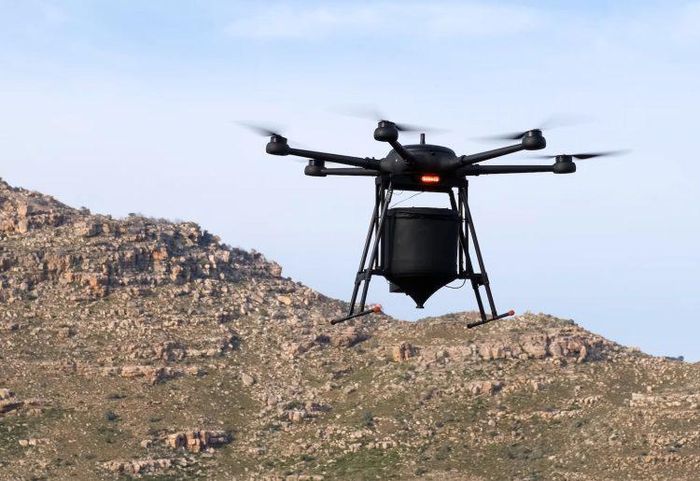AI- Solution to combat global climate change
Increase forecast speed
The recent launch of the United Nations AI Governance Advisory Body has accelerated the trend of using technology to find solutions to common challenges. Accordingly, AI is used to accelerate and expand efforts to realize global ambitions such as the 2030 Agenda and the 17 Sustainable Development Goals (SDG).
Whereas scientific discovery previously depended on humans' ability to collect, observe, and analyze, computers can now crunch huge data files, identify patterns, and run simulations in about a second. much shorter time. At the COP28 Conference, the US Aerospace Agency (NASA) and IBM Computer Corporation introduced the AI tool Watsonx, allowing users to monitor the Earth from space, measuring environmental changes that are occurring. out and make predictions.
Data warehouses from NASA and IBM Watsonx AI technology help scientists estimate both past and future levels of wildfires, floods, and urban temperatures. Estimates from NASA say that in 2024, scientists will be able to work with 250,000 terabytes of climate data sets. Previously, Google's Google DeepMind project launched in 2019 trained a weather forecasting AI model to predict the capabilities of wind energy, helping to increase the value of renewable energy sources.

Australia uses drones to control flora and fauna. Photo: Creativedigital
Currently, the situation happening in the Arctic is a worrying warning sign. The climate models being used by many scientists to predict long-term change do not seem to capture the rate at which the climate is warming. However, with the help of AI, Anna Liljedahl, a scientist at the US-based Woodwell Climate Research Center, can make forecasts of permafrost by season, instead of by time period. the usual 100-year period. This helps her and many other researchers see a clearer picture of the rate of ice loss in the Arctic.
Ms Liljedahl said: 'AI is doing the most difficult tasks. We consider this as an initial tool, then humans will participate in the process and ensure that everything is going in the right direction as well as explore and test AI's suggestions.
Powerful arm
At the national level, AI is becoming a powerful arm supporting environmental control. In Australia, rangers fly drones in nature reserves to monitor changes in flora and fauna from the air, and AI software is used to evaluate the images. Algorithms are used to count animals or analyze plant species and pests. They can indicate where rangers need to intervene to keep wetlands from becoming unbalanced.
In Singapore, the island government has used AI to predict floods and test the flood resilience of infrastructure. The Philippines is also making great efforts to use AI to solve climate change challenges and reduce risks from natural disasters. China is one of the leading countries in using AI to mitigate the effects of climate change. This populous country is using AI in weather forecasting, water resource management and energy production optimization.
Meanwhile, India uses AI for smart agriculture and water resource management. AI technology helps farmers in India optimize water use, reduce waste, and increase productivity. In Japan, two leading Japanese corporations, NEC and Sumitomo Corporation, plan to cooperate in a plan to develop services using AI to respond to drought and support farming worldwide by 2024. The purpose of NEC and Sumitomo is to provide solutions to support stable food production in the context of food crises caused by frequent extreme weather events.
By using AI to combine and analyze large amounts of data related to farming such as past planting history, information from satellites and sensors installed on farms, our support services The NEC - Sumitomo alliance will propose the best farming methods to help increase productivity, while saving water and fertilizer. Users can also check estimated harvest data and optimal harvest dates on their smartphone or computer.
European countries are also focusing on using AI to achieve renewable energy and emissions reduction goals. Energy management, smart transportation, and forest management systems through AI technology are being widely deployed. In Africa, the IKI project uses AI to help vulnerable communities in Burundi, Chad and Sudan, by predicting weather patterns, allowing communities and authorities to better plan for adapt to climate change and minimize its impacts.
Suggested improvements
There is a downside to AI, which is that launching the model consumes a lot of energy and most of the data centers that are operated still depend on fossil fuels.
A study by Dutch researcher Alex de Vries estimated that, in a worst-case scenario, Google's AI system could consume as much electricity as the entire country of Ireland each year. Developers are advised not to just focus on AI optimization but also to seriously consider the urgency of using AI in the first place, as the operating costs are huge.
Some data center operators have begun to address this concern. Amazon Web Services, the cloud computing division of online shopping giant Amazon, has committed to being 'water positive' by 2030, meaning the company will 'return more water to the communities where placing data center infrastructure relative to the amount of water used.
For example, in Oregon, an area where drought has been increasing in recent years, Amazon Web Services has provided free used water to cool its data centers for local farmers to use in their daily needs. irrigation.
Technology experts also suggest that AI should be affordable and accessible to some low-income countries, especially those in the Global South that are on the front lines of the climate crisis.